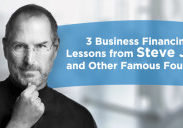Rollovers for Business Startups
ROBS let you invest your retirement money in your business with no debt, no taxes, and no early withdrawal penalties
Overview of Rollover for Business Startups
A Rollover for Business Startups (ROBS) unlocks the power of your retirement account to fund your business. You can invest retirement funds that are in a 401(k), traditional IRA, or other eligible retirement plan into your business without having to pay early withdrawal penalties or income taxes. While there are risks to putting retirement money in a business, there are also potentially large payoffs. You can start your business debt-free, and business profits can grow in a tax-advantaged account.
 Free Guide To
Free Guide To
Small Business Financing
How A Rollover for Business Startups Works
A Rollover for Business Startups (ROBS) (aka a Business Owner’s Retirement Savings Account (BORSA)) lets you transfer funds from your 401(k), traditional IRA, 403(b), or other eligible retirement plan into your business. There are no early withdrawal penalties or income taxes. This is a great option for people who want to start a new business, buy an existing business, or recapitalize a business.
The amount of money you can use is limited only by the size of your retirement account. Because of the fees involved, we recommend ROBS only if you’re going to roll over at least $50,000.
The biggest reason to get a ROBS? It’s not a loan. You use your own money to start your business, so there’s no debt incurred. Profits that your company earns can be reinvested into the business instead of eaten by debt and interest payments.
Arranging a ROBS can be complicated from a legal and tax standpoint. You must create a C Corporation and a new company-sponsored 401(k) or profit sharing plan. The funds from your personal retirement account are rolled over into the company-sponsored plan, which buys stock in your company. The money from the sale of stock is then used towards your business. With so many moving parts, it’s important to have professional assistance. To get started, complete this quick form.
A Rollover for Business Startups can be a risky funding mechanism. If your business fails, you can lose your nest egg for retirement. However, if the business succeeds, your company profits will grow in a tax advantaged account, which can actually increase the size of your nest egg. Every business owner should carefully weigh the pros and cons before proceeding with a ROBS.
Will I Qualify for a ROBS?
You must have an eligible retirement plan to do ROBS. Qualified retirement plans include 401(k), 403(b), 457(b), traditional IRA, and more (roth IRAs are not eligible). We recommend ROBS for those who have at least $50K in retirement funds.
Ready to speak to a ROBS professional? Visit Guidant.
Cost of a ROBS
A ROBS is not a loan, so you do not incur debt and do not have to pay interest. If a ROBS is structured correctly, you also won't have to pay income taxes or early withdrawal penalties. However, there are rollover fees, averaging $5,000 upfront and $1,400/year after that on an ongoing basis.
Ready to speak to a ROBS professional? Visit Guidant.
The Details:
Maximum Loan Amount
As much your retirement account contains
Typical Loan Term
Not applicable
Typical Interest Rates
No interest - not a loan
Speed
3-4 weeks
Down Payment?
None
Collateral
None
Personal Guarantee?
None
Have a question?
Pros
 Can be used to fund a startup, buy a business or franchise, or get working capital for a current business.
Can be used to fund a startup, buy a business or franchise, or get working capital for a current business.

ROBS isn’t a loan, so you can start your business debt-free.

No taxes or early withdrawal penalties.
 Business profits go into a tax advantaged account.
Business profits go into a tax advantaged account.
Cons
You can lose your nest egg if the business fails.
You must administer the company-sponsored retirement plan, which is open to eligible employees.
ROBS invites increased scrutiny from the IRS.
How to Apply
Answer Simple Questions
Browse Your Loan Options
Get Funded in Record Time
Additional Resources
Success Stories
3 Business Financing Lessons from Steve Jobs and Other Famous Founders
Finding funding for a small business can be daunting. A Google search for “small business loan” brings up 180 million results! In part, this is because the last few years have seen a surge in business financing options. Nonetheless, some approaches stand the test of time. Here are 3 lessons you can learn from how […] Read More









